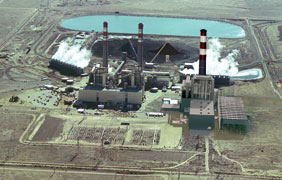 |
| BASICS Utility doesnt want independent power producers for new Comanche unit. (Image courtesy of Xcel Energy) |
A move by Minneapolis-based Xcel Energy to opt out of new rules in Colorado that require it to bid out new sources of energy has independent power producers worrying about their future.
IPPs claim Xcels request for a waiver to develop on its own a $1.3-billion, 750- MW coal-fired unit at the Comanche Generating Station site near Pueblo is the latest example of utility efforts to move back to regulated energy.
The Colorado Public Utility Commission adopted the rules 18 months ago to obtain least-cost electricity for consumers by requiring plants over 250 MW to be competitively bid. They were developed together by Xcel and Colorado Independent Energy Association.
Xcel says it is seeking the waiver so soon after the rules adoption because the energy business landscape has changed. "Since deregulation never came about, the same rules dont apply now, says a spokeswoman for the utility. The Colorado Independent Producers June 10 intervened in Xcels waiver application.
The Colorado dispute is an example of a national issue that manifests itself locally, says Julie Simon, vice president of policy for the Electric Power Supply Association. "It is a basic decision of how to supply new energy," she says. "In the last decade it was through competition, but now utilities have back-to-basics business strategies.
That means ownership and control, with investments added to the regulated base rather than to the merchant model, according to Simon. EPSA supports market tests to determine what is best for consumers, and the group considers Colorados rules as among the best.
Risk appears to be the crux of the issue. "Thats what the tension is, says Bill Mogel, an energy attorney with Dorsey & Whitney, Washington, D.C. "Utilities want as much of a risk-free investment as possible," he contends. "If they can put it in the rate base, it makes it almost riskless.
|
But IPPs say you cant have it both ways. "Xcel says independent producers are not capable of building coal-fired plants at a good price, but at the same time they are asking for recovery of the cost to build it as they go, because it is too risky to build themselves, says a member of the Colorado Independent Energy Association.
To add to the problem, Standard & Poors increased the debt equivalency of power purchase agreements with independent power producers, which affects a utilitys credit rating. Utilities are saying privately that they feel the pressure to change the equity in their balance sheets back to rate-based.
To that end, several utilities have asked that their affiliate merchant plants be added back into the rate base because their investments are struggling. But allowing utilities such a safety net creates an unfair situation, and makes it difficult to achieve benefits of competition, says EPSAs Simon.
Problems in the industry have caught the attention of the Federal Energy Regulatory Commission, which held hearings June 9-10. Participants suggested remedies such as excluding utility affiliates from bidding on new sources of energy, turning over solicitations to an independent monitor and developing federal procurement standards.



Post a comment to this article
Report Abusive Comment